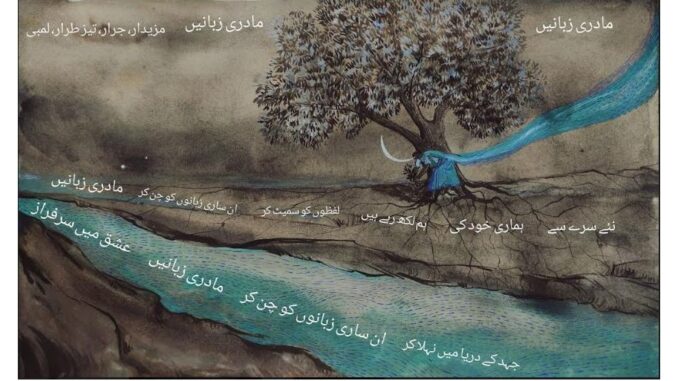
S
he was stitching away rapidly, pinning her flying rage onto the kantha coverlet. She had learnt the stitch from her grandmother. As a child she had watched, with utter fascination, the magic of grandma's wrinkled fingers turn rags – little soft pieces of old dhotis , cotton sarees , worn out kameez collected over time – into finely embroidered quilts. It was one such piece done by grandma that came with her dowry when she got married. A safety blanket she held on to, ever more tightly, on troubled cold nights. But it was when she started stitching a coverlet of her own that she felt closest to Naani jaan . It was as if she had learnt to speak her language. It was not imagination, or blasphemy, or rebellion that guided her
needle. She came alive at its tip, she loved and spoke with the thread, lived in the patterns it created. She roamed freely inside the stitches, and motifs. She dreamt and parrots flew on the pale white, the splendour of their wings red, orange, green dyed the flower vines next to it. Her anger glistened on the thin, sharp edges of the leaves; resentments deepened the densely stitched centres of flowers. The fish, horses, elephants, and bees marched to the rhythm of her untold stories.
Mothers’ tongues
Perhaps, neither my mother nor I
ever had a tongue
Men are gifted with tongues.
A masculine heritage
that they can wield as they wish,
to invent slurs,
to spit anger,
to dictate laws,
to scream,
to write hollow love letters,
to engrave walls,
to forge histories.
Tongues of men are
wrapped in hardbound dictionaries.
Machines have been invented
to print them.
Their names have been imprinted
under the lines of poems
written by our mothers.
Their books written in their tongues
lie wrapped in cobwebs
on the dust laden shelves of big libraries.
Be the parliaments or the rallies
it is their tongue that is
spoken
heard
documented
written
understood
advertised.
Our mothers’ tongues are different –
their impression
their impact
their style
their history
their performance.
They have carved their pens out this earth
dipped them in love,
drenched in the mystic smoke of the Loban
washed them in the oceans of sweat
and kept them hidden
between the folds of old sarees
at the bottom of a trunk, safe.
It is these earthen pens that have,
at some ripe moment,
written on our palms, in bloodied ink
our mother tongues.
And when they could not craft the pens,
behind the closed doors of the room
they whispered our mother tongues,
the queens, the slave women.
And those who had no rooms, or castles
etched with sickles and trowels,
on the mud-covered earth in their fields,
on the floors of their huts
our mother tongues.
Those with skills at their fingertips
have embroidered on abayas and sarees
our mother tongues
of aari, mukaish , and zardozi
Our mother tongues –
inscribed on the gravestones
burnt to ashes in the flames of the pyres
written on the red sky
opening inside the dream-filled, sleepy eyes.
Our mother tongues –
the crimson call of revolutions
the beating of our hearts
the music of love
the restless desires.
Our mother tongues!
The tongues of men are all the same
same colours
same patterns
same sounds,
unlike these
swaggering in many hues, diverse,
melodious tongues of our mothers.
Our mother tongues,
like the words that came from Akhtari’s throat
like the ways learnt from Fatima
like the pinnacle of love.
Plucking each one of them
gathering all the words
we are now writing
a new beginning,
in our own exciting, brave,
argute, sharp-witted,
long mother tongues.
******
Text and visual Courtesy: PARI. Original title: Lives and Languags Hanging by a Thread. Feb 20 2023
Hear Sabika Abbas in Urdu and Prathista Pandey in English recite the poem here: https://ruralindiaonline.org/en/articles/lives-and-languages-hanging-by-a- thread/

Leave a Reply